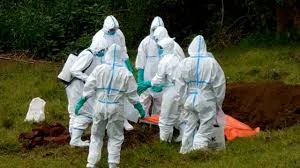 Uganda has implemented lockdown measures in response to an increasing outbreak of Ebola, centered in the Mubende and Kassanda districts. The government confirmed the lockdown following a rapid escalation in cases caused by the Sudan ebolavirus. The measures, effective as of May 9, restrict travel and gatherings in high-risk areas and are intended to prevent further spread of the virus within Uganda and beyond its borders.
Uganda has implemented lockdown measures in response to an increasing outbreak of Ebola, centered in the Mubende and Kassanda districts. The government confirmed the lockdown following a rapid escalation in cases caused by the Sudan ebolavirus. The measures, effective as of May 9, restrict travel and gatherings in high-risk areas and are intended to prevent further spread of the virus within Uganda and beyond its borders.
The lockdown specifically restricts movement in and out of Mubende and Kassanda, only allowing cargo and essential services to continue. Public places, including markets, bars, and places of worship, are temporarily closed, and a nightly curfew has been imposed to limit public gatherings. President Yoweri Museveni emphasized the importance of these steps to curb transmission as quickly as possible.
Health officials, in coordination with the World Health Organization (WHO) and other global health partners, have launched an extensive response. This includes the establishment of isolation centers, deployment of contact tracers, and public health education campaigns aimed at raising awareness of Ebola transmission. Since the Sudan strain lacks a specific vaccine, containment efforts have focused on limiting contact, enhancing hygiene practices, and supportive care for infected individuals. International partners, including Médecins Sans Frontières (MSF) and the International Federation of Red Cross and Red Crescent Societies (IFRC), are supporting Uganda’s Ministry of Health by providing resources, personnel, and medical supplies to strengthen the response.
This Ebola outbreak in Uganda marks the first caused by the Sudan ebolavirus since 2012. The rapid spread within certain districts has put local health infrastructure under pressure, particularly with the rising number of cases presenting in urban centers, which complicates containment. Local leaders have expressed concerns regarding supply shortages, especially personal protective equipment (PPE) and food for those under quarantine, which are critical to sustaining the response efforts.
Ugandan health authorities continue to monitor the situation closely, working to contain the outbreak and prevent further spread. The response highlights the importance of early interventions and public cooperation in managing viral outbreaks effectively.



















